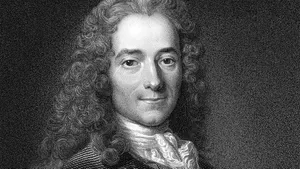Voltaire: A Titan of the Enlightenment
François-Marie Arouet, better known by his pen name Voltaire (1694-1778), was a towering figure of the French Enlightenment, a philosophical and intellectual movement that emphasized reason, individualism, and scientific inquiry. He was a prolific writer, leaving behind a vast and diverse body of work that included:
- Plays: Voltaire was a celebrated playwright, with tragedies like “Oedipus” and “Zaïre” achieving immense success.
- Poetry: He wrote epic poems like “The Henriad” and “The Maid of Orleans,” along with numerous shorter poems and satires.
- Philosophy: Voltaire’s philosophical works often took the form of essays, pamphlets, and novels, advocating for religious tolerance, freedom of speech, and social justice. His most famous philosophical works include “Letters Concerning the English Nation” and “Candide.”
- History: Voltaire also wrote extensively on history, aiming to challenge established narratives and promote critical thinking.
Early Life and Education:
Born in Paris in 1694, Voltaire received a solid education, immersing himself in classical literature and philosophy. He displayed a talent for writing from a young age, penning his first published work, a poem, at just 18.
Turbulent Times and Exile:
Voltaire’s outspoken nature often landed him in trouble with authorities. His satirical verses criticizing the French aristocracy led to imprisonment in the Bastille in 1717. He later faced exile in England for an altercation with a nobleman. During these periods of exile, Voltaire encountered new ideas and perspectives that significantly influenced his thinking.

Champion of Enlightenment Ideals:
Upon returning to France, Voltaire became a vocal advocate for Enlightenment ideals. He championed religious tolerance, criticizing the excesses of the Catholic Church and advocating for freedom of belief. He also spoke out against social injustices like slavery and religious persecution. His wit, sharp satire, and eloquent writing style made him a powerful voice for reform.
Legacy and Contributions:
Voltaire’s influence extended far beyond his lifetime. His writings inspired generations of thinkers and revolutionaries, paving the way for modern concepts of democracy, freedom of expression, and religious tolerance. He remains a controversial figure, however, due to his often scathing criticisms of religion and established institutions.
Key Points to Remember:
- Real Name: François-Marie Arouet
- Pen Name: Voltaire
- Lived: 1694-1778
- Nationality: French
- Occupation: Writer, philosopher, historian
- Key Achievements:
- Championed Enlightenment ideals like reason, tolerance, and freedom of speech.
- Wrote extensively across various genres, including plays, poetry, philosophy, and history.
- His works had a profound impact on intellectual and political movements throughout Europe.
Further Exploration:
To delve deeper into Voltaire’s life and work, consider exploring the following resources:
- Biographies: Numerous biographies offer detailed accounts of Voltaire’s life and achievements.
- Online Resources: Websites like the Voltaire Foundation and Britannica provide valuable information and analysis of his works.
- Primary Sources: Reading Voltaire’s original writings, such as “Candide” or “Letters Concerning the English Nation,” offers firsthand insight into his ideas and writing style.
By understanding Voltaire’s life and contributions, we gain a richer appreciation for the Enlightenment period and its lasting impact on our world.
